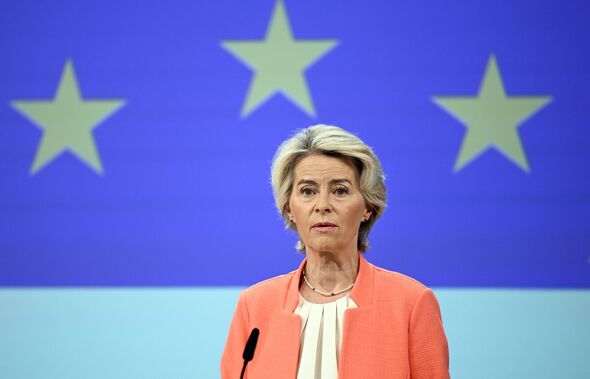A highly anticipated report commissioned by the EU calls for a “new industrial strategy for Europe”, and warns the bloc will need to raise investments by €800bn (£674bn) a year to avoid “a slow agony”.
The study, led by economist and former Italian PM Mario Draghi, says the funds are necessary for the EU to meet its key competitiveness and climate targets, and fund urgent reform to prevent the group of nations falling behind China and the United States.
Mr Draghi warned the bloc’s aims to strengthen its geopolitical relevance, social equality and decarbonisation are being threatened by the superior growth and productivity of the two superpowers.
If Europe isn’t able to improve on these two measures, EU nations risk seeing a deline in living standards, he said. “We will have to scale back some, if not all, of our ambitions,” Mr Draghi continued, adding: “This is an existential challenge.”
The vast sums, which Britain would no longer have to stump up after leaving the EU in January 2020, are equivalent to 4.4-4.7 per cent of the international organisation’s GDP, The Financial Times reports.
It would see investment-to-gross domestic product rising to the highest level since the 1970s.
Mr Draghi, who was credited “saving the euro” during his eight-years as head of the European Central Bank, voiced support for a total overhaul of the union raises investment funding, including “new common funding and common assets”, and called for leaders in Brussels to push a major reorientation the bloc’s economic policy.
Among the key recommendations in the report for European Commission President Ursula Von der Leyen are relaxing competition rules to allow market consolidation in sectors such as telecoms; integration of capital markets through the centralisation of market supervision; more joint procurement in the defence sector; and a new trade agenda to make the EU more economically independent.
“Never in the past has the scale of our countries appeared so small and inadequate relative to the size of the challenges,” Mr Draghi warned. “The reasons for a unified response have never been so compelling — and in our unity we will find the strength to reform.”
But while he denied that his prescription for the bloc’s economic challenges were “do or die”, he bleakly told reporters that it more like a “Do this, or it’s a slow agony” situation.
“We have reached the point where, without action, we will have to either compromise our welfare, our environment or our freedom,” he added.
His report comes ahead of a new five-year term for the commission amid economic stagnation, the rise of far-right parties in Europe, and the ongoing war in Ukraine on its eastern border.
Draghi wrote that the private sector is “unlikely to be able to finance the lion’s share of this investment without public sector support,” and noted that “some joint funding for investment in key European public goods, such as breakthrough innovation, will be necessary”.
He said a common safe asset and joint EU funding are need to support “European public goods” including joint defense producurement and common energy infrastructure, but acknowledged that there isn’t sufficient political for it to happen yet.
New levies would also be needed at the EU level to fund more effective spending through the common budget, Draghi wrote.
But calls for more taxpayer cash to be sent the union or pushes to raise new joint EU debt would be rejected by the more frugal governments of countries like Germany and the Netherlands and Germany which are against additional financing for the bloc.
One EU diplomat told the outlet that “proposing joint EU borrowing in the current political climate across the EU is an absolute non-starter.”
Von der Leyen, who will draw upon the report in mission letters setting out the commisions goals to her new team of commissioners set to be unveiled on Wednesday, acknowledged common funding was needed “for certain common European projects” like cross-boder energy infrastructure and defence.
But she said it would still be possible to finance them with taxes at the EU level that go towards the union’s joint budget or extra national contributions.
